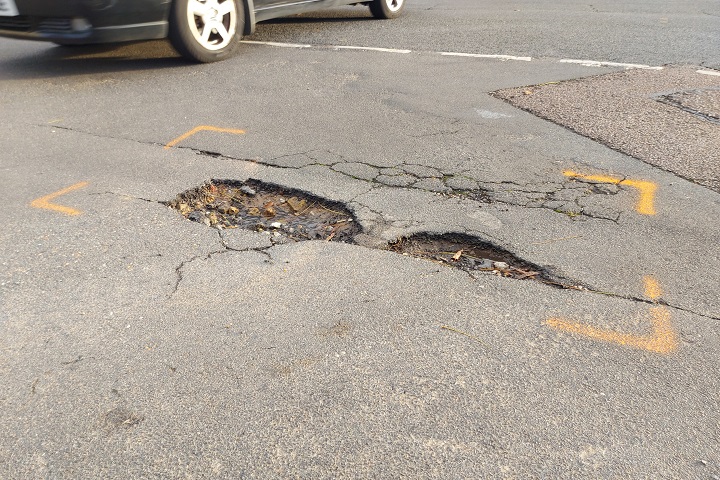
Local authorities are taking wildly differing approaches to deciding whether or not potholes get fixed, meaning many go unrepaired and continue to pose a risk to road users – especially those on two wheels.
That’s according to analysis conducted by the RAC and Channel 4’s Dispatches, which aired last night (Thursday 23 May).
Of the 206 councils in Great Britain with responsibility for roads, 29% (or 59) don’t state any criteria publicly online for repairing potholes. Some 35% list specific depths, and in some cases widths, while 37% (76 councils) say they take a ‘risk-based approach’ to deciding which potholes to fix and how quickly.
According to the RAC, this means members of the public who proactively report potholes to local authorities with a view to getting them repaired ‘may often be left frustrated when no action is taken and potholes are simply left to get bigger in order to merit repair’.
Among the 35% of councils (71) that say they will only act on potholes if they meet certain criteria, the most common depth stated is 4cm (54 councils) but in the case of six councils – Warwickshire, Torbay, Thurrock, Nottinghamshire, Torfaen and South Lanarkshire – potholes need to be at least 5cm deep to be considered for repair.
Thirteen local authorities meanwhile, including Buckinghamshire, Stockport and Devon, state only those at least 30cm wide – the length of an A4 sheet of paper – and 4cm deep will get fixed.
While 29% of councils don’t provide criteria on their website for what constitutes a pothole they’ll fix, even the 37% which take risk-based approaches don’t often provide much information to explain how this works, the RAC says.
Following these findings, the RAC fears the lack of a consistent approach among local authorities to pothole repairs is bad for all road users.
Specifically, the RAC is concerned the use of specific size-based criteria could be being used by councils as a means of ‘kicking the can down the road’ and avoiding repairing potholes.
The RAC is now calling on:
- The Government to instruct councils to take a risk-based approach to deciding when road defects need attention. New guidance should include criteria councils must use when assessing potholes – including how busy a road is, and how commonly it is used by cyclists – and recognise that just because a pothole may not meet certain depth and width measurements, it may nonetheless represent a hazard to road users
- Local authorities, if they are not already doing so, to publish the following on their websites that can be easily found by anyone reporting a pothole:
- The criteria used for assessing reported potholes to decide how soon they are fixed
- What happens once a member of the public has reported a pothole, including how soon the road in question is assessed
- A phone number for reporting potholes that the public deem to be emergencies
Rod Dennis, RAC spokesperson, said: “For a long time, we’ve advised the public to report each and every pothole they come across to their local authority, not least as a council can refuse to compensate for damage caused from hitting one if they can prove they didn’t know it existed.
“But unfortunately, as this analysis shows, just reporting a road defect doesn’t guarantee it will get fixed.
“In some cases, councils state a pothole needs to be sufficiently deep or wide to be considered for repair. This can be enormously frustrating for anyone who comes across one, reports it but then witnesses it get even bigger and more dangerous as it didn’t quite reach a council’s threshold for repair.
“What’s just as bad is when a council provides no information whatsoever on how they decide which road defects warrant their attention and which don’t. In these cases, drivers going to the effort of reporting potholes have no idea at all whether anything will ever happen.
“There’s no doubting councils are in an incredibly difficult position when it comes to looking after their roads. Despite the promise of more funds from central government, the fact remains that the desperate state of many of the country’s highways is something that has been many years in the making, and there are no quick fixes.
“We believe there is an urgent need for Whitehall to provide fresh guidance to councils to bring about consistency when it comes to prioritising potholes and taking action to fix them.”
Comment on this story